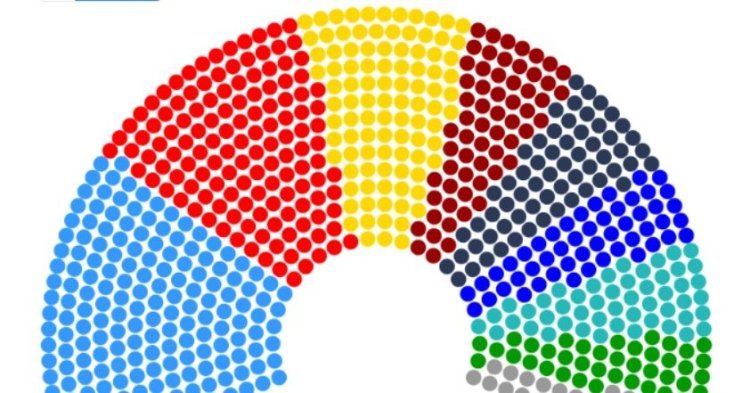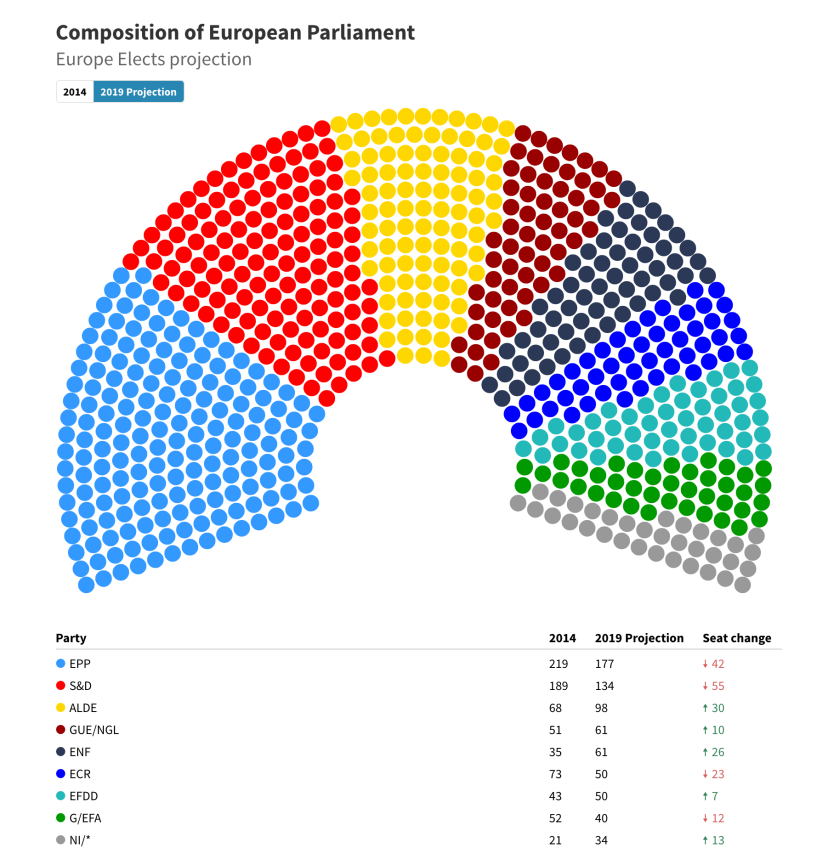The two largest groups experience losses amid worrisome election results
The European People’s Party group (EPP) are projected to retain the dominant position in the European Parliament, according to the latest Europe Elects prediction from October 2018, with 177 representatives. This figure lies far below the 215 MEPs obtained in 2014 and reinforces the downward trend we have been witnessing for the last six months.
Theoretically, the decline in popular support for the centre-right EPP could play in favour of the Progressive Alliance of Socialists and Democrats (S&D), but the latter has, so far, struggled to take advantage of it. They are expected to lose more than fifty representatives since the 2014 elections, down to 134 in this month’s projection, leaving them closer to the third position than to EPP. This news comes in spite of their popularity in Spain, Portugal, Denmark and Sweden, where S&D parties have consistently polled strongly.
It certainly seems the era of two-party politics in Europe is coming to an end, and this trend holds for regional elections too: this month, the SPD’s meltdown in Bavaria paved the way for the best result of the German Green Party in the southern state, winning the capital, Munich. If the social democrats saw 230,000 voters switching to the Greens, the hegemonic CSU lost at least 150,000 votes to three parties: the liberal FW (ALDE), the Greens (G/EFA) and the right-wing AfD (EFDD).
How the results in Bavaria, Belgium or Luxembourg play out for the two biggest actors in the European Parliament during the Spitzenkandidaten races is yet to be seen. On the part of the European People’s Party, the race has stretched to two candidates; Alexander Stubb of Finland and Manfred Weber of Germany. The latter has been regarded as the frontrunner after winning support from all the 8 ruling EPP parties in Europe, but it is the 758 delegates attending the upcoming congress in Helsinki (November 7-9) that will have the last word. Regarding the S&D, after Christian Kern’s resignation in early October, the Congress to be held in Lisbon (7-8 December) will probably choose between Marcos Šefčovič of Slovakia and Frans Timmermans of the Netherlands, both current EU Commissioners.
ALDE results stabilise as they wait for Macron
Europe Elects predicts 98 seats for the Alliance of Liberals and Democrats (ALDE), up from 68 seats in the current Parliament. The liberals, thus, would still fare substantially better than in 2014, even though some of its biggest parties might have lost momentum. Emmanuel Macron’s popularity levels in France have reached record lows, and Spanish Ciudadanos has lost ground to both PP (EPP) and PSOE (S&D). Liberal parties in Denmark, Germany and Sweden have not experienced improvements in the latest national polls, whereas Dutch and Estonian liberals continue to poll strongly.
The future of the liberals within the Parliament is precisely in the hands of the French president; the formation of a new group led by LREM would leave ALDE with an ostensibly worse result than its present representation. Before an agreement is reached on the issue, ALDE members have already declared its intention to put forward a transnational Spitzenkandidat for the 2019 European election, according to several sources. Former Belgian Prime Minister and the current leader of the liberals, Guy Verhofstadt, and the EU Commissioner for Competition, Margrethe Vestager of Denmark, are two of the favourites to run.
GUE/NGL and ENF continue to improve results
Our October projection for the next European elections predicts a tie at 61 MEPs for the left GUE/NGL and far-right ENF, both substantially above their 2014 results (51 and 35 seats, respectively). The fact that both groups are yet to yield a Spitzenkandidat, thus, does not seem to affect their rising trend, and the possible candidacy of Lega’s Matteo Salvini could propel ENF to even stronger results. Despite these gains, Europe Elects’ forecasted results would not allow these groups to elect a President of the Commission. But due to their sheer size, most likely leading the opposition, could exert a remarkable influence in the agenda-setting of the Parliament.
Turning our attention to the national level, left parties in Ireland, France, the Netherlands and Portugal are on the rise, while the German die Linke and Spanish Podemos continue to poll strongly. The popularity of Marine Le Pen’s RN and Salvini’s Lega are the main growth drivers for ENF.
ECR mitigates losses; EFDD’s AfD enters the Bavarian parliament for the first time
Europe Elects predicts another tie at 50 representatives in the European Parliament between the national conservative group ECR and EFDD. Whereas the loss of 23 seats by the former can be attributed to the exit of British Conservatives after Brexit, the EFDD group seems to compensate its reliance on UKIP MEPs with the German AfD and Italian M5S’ success.
ACRE, the main party within the ECR group, will announce a candidate to become the next European Commission president in November. Hans-Olaf Henkel, German MEP and member of the Liberal Conservative Reformists, is the only proposed name thus far. The EFDD might experience a leadership vacuum after Brexit and an uncertainty surrounds their future existence, as they might not meet the requirement of MEPs from 7 EU countries. However, UKIP’s Nigel Farage last week stated his intention to run for the next European Elections if Brexit includes a transition period. We will have to wait and see how feasible this potentially game-changing possibility turns out to be.
Big wins by Green parties yet to be reflected in the European Parliament
Green parties achieved record highs in local elections in Belgium and regional elections in Bavaria and Luxembourg. And even though Europe Elects predicts a slight increase since last month (+3), their 40 MEPs would still be well below the 52 representatives achieved in 2014. Polling very strongly in Germany and the Netherlands, they will need to improve their results in France, Scandinavia or the Baltic countries if they aim at repeating the 2014 results.



Follow the comments: |
|
